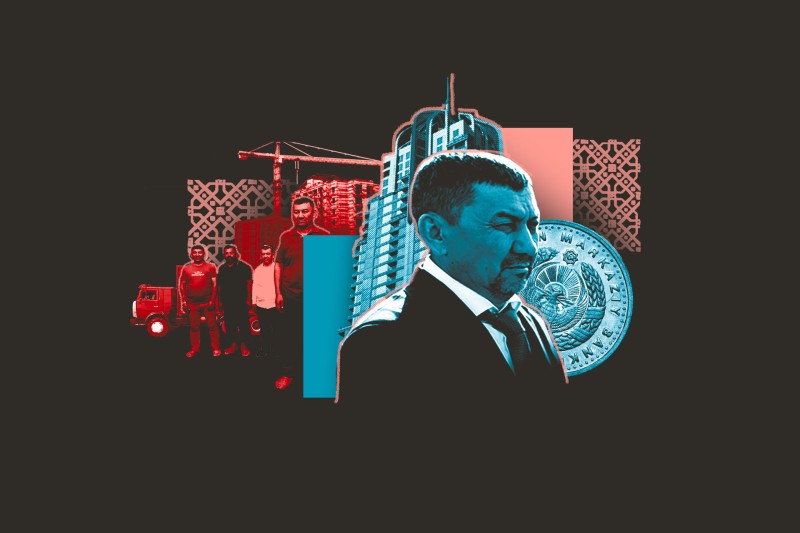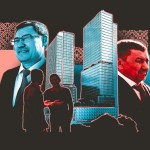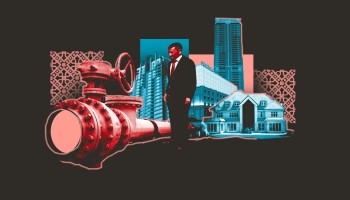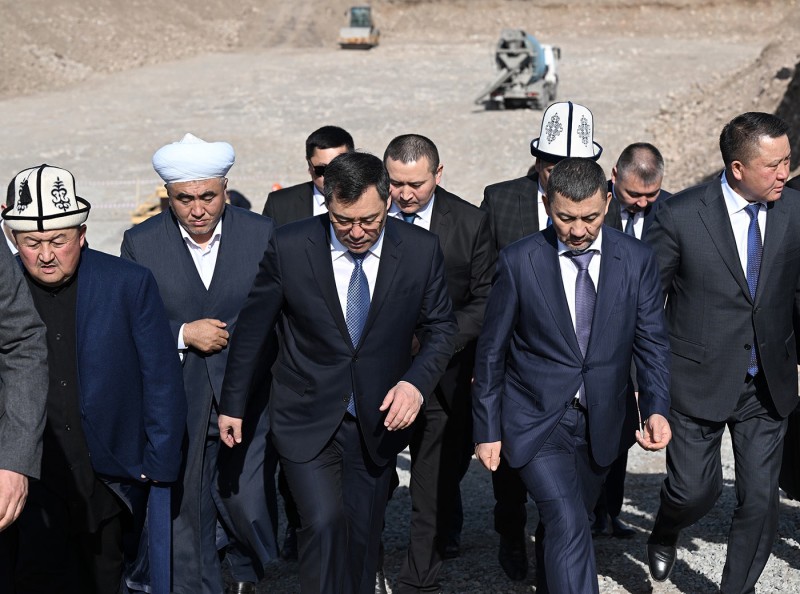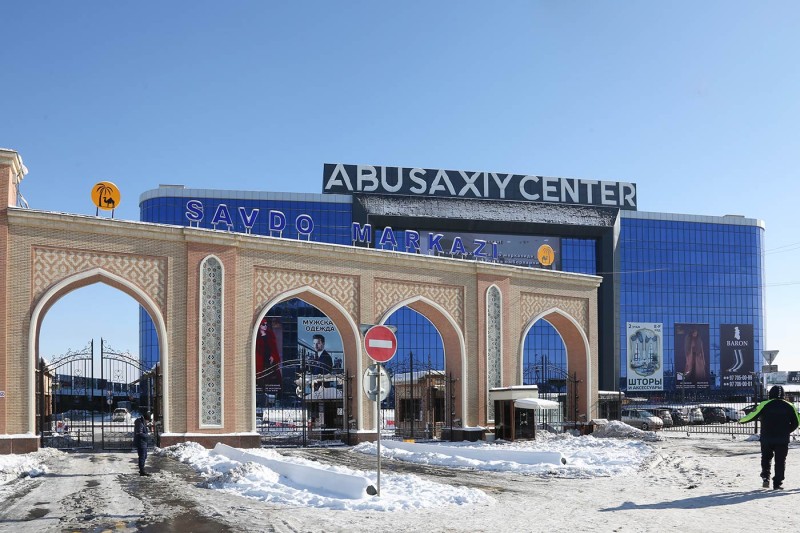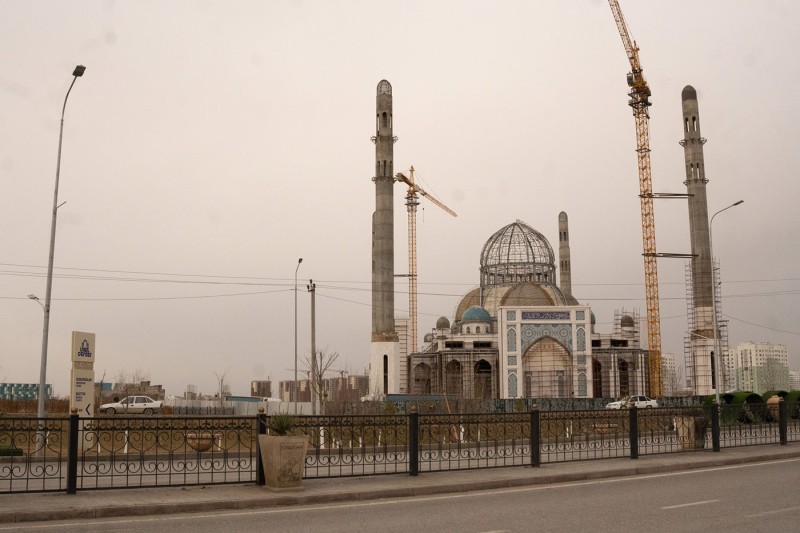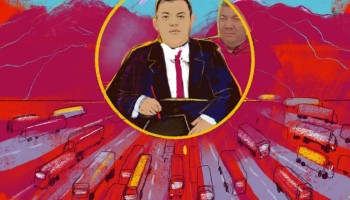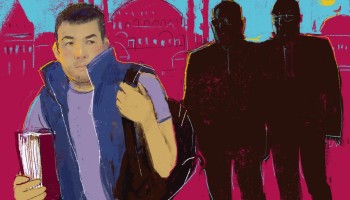A 43-story skyscraper on Dubai’s waterfront. A luxury hotel in the heart of ancient Samarkand. A seven-bedroom London mansion. Gas pipelines that supply an entire Kazakh city.
As a new investigation by OCCRP, RFE/RL, Kloop, and Vlast reveals, these assets and businesses across the world, worth billions of dollars, belong to a single family.
The Abdukadyrs, whose path to fortune is lined with bribery and political patronage, are exceptionally secretive. Members of this Uighur family use several variations of their first and last names and hold multiple citizenships. Most of their companies have no web sites, do not advertise themselves as a single holding, and are held by relatives or associates.
The family has good reason to operate from the shadows. In 2019, OCCRP, RFE/RL, and Kloop exposed how they made their fortune: The eldest of four brothers, Khabibula Abdukadyr, ran a trading monopoly that made enormous profits channeling Chinese goods into Kyrgyzstan, Uzbekistan, and beyond — with the complicity of corrupt customs officials.
The exposé brought Kyrgyzstan’s citizens onto the streets, and the Abdukadyrs’ top political patron in the country eventually pled guilty to corruption.
But the family remained untouched. Their companies in Germany, the United States, Turkey, and other countries, which had received vast sums of apparently laundered money, remained open. What the Abdukadyrs did with this money remained a mystery.
Now, reporters from OCCRP, RFE/RL, Kloop, and Vlast have found that the family’s companies have spent the last few years making colossal investments in new, legitimate businesses. Corporate and land records, government investment data, internal company documents, and other sources reveal that the Abdukadyrs have spent and committed at least $2 billion into projects and luxury assets on several continents. This is a conservative estimate that does not include many assets whose value is unknown.
Most of this money has gone into Central Asia, the Abdukadyrs’ original base of operations, where the family is building entire new neighborhoods, brand-new customs terminals, and even a vast new center of Islamic study and worship. In Uzbekistan, they have become some of the country’s largest “foreign investors.” Local governing elites — and even national leaders — have lined up to welcome them, even though their alleged smuggling and money laundering operations have been a matter of public knowledge for over three years.
Despite his many promises of reform, Uzbek President Shavkhat Mirziyoyev has embraced the family and their millions: Many of their projects have even received government support, including tax breaks, state land, and publicity. But that support doesn’t come for free. Reporters found that Mirziyoyev’s own relatives have become co-investors with the Abdukadyr family on some of their projects.
Khabibula Abdukadyr has even resurfaced recently in Kyrgyzstan, a country whose political system was shaken by earlier revelations of his schemes. In March, he appeared at two public events with President Sadyr Japarov, keeping close to Kyrgyzstan’s leader at ceremonies inaugurating the construction of a new mosque and a major real estate development. Both, it turns out, are Abdukadyr projects.
Kristian Lasslett, a professor of criminology at Ulster University who has studied the Abdukadyr family, described their investments in Uzbekistan as corrosive to both economic and political freedoms.
“We’ve seen the Mirziyoyev government really effectively manicure itself on the international stage as this kind of reformist and modernizing government,” he said.
“But these kinds of investments are … adding blood into the veins of kleptocracy,” he said. “It's not a kind of conventional free market economy. It’s a sheltered workshop for protected political animals.”
“Obviously, when people inject [this kind of] capital into that political economy, it only further strengthens it and deepens its roots. And of course, to protect the status quo, you can’t have citizens asking questions.”
David M. Luna, executive director of the International Coalition Against Illicit Economies and a former U.S. diplomat, said “we must continue to fight corruption.”
“In autocracies, the corruptive influence of criminals enables complicit ruling elites to line their pockets and launder their dirty monies,” he said. “And in democracies where kleptocracy takes hold, the abuse of power by corrupt officials often accelerates unjust power systems and insecurity that animate economies to spiral downwards into failed states."
Reporters sent over 50 requests for comment to the people, organizations, and government institutions named in this investigative series. Most did not respond, including President Mirziyoyev’s administration. The Abdukadyr family acknowledged receiving questions from an email address known to be used by Khabibula Abdukadyr, but said they could provide information only at a later date.
A spokesman for Kyrgyz President Japarov said that “Kyrgyzstan is open for all investors. We are ready to work with everyone who is truly ready to invest money into projects in the country’s various sectors.”
An Illicit Fortune Exposed
Khabibula Abdukadyr’s alleged smuggling empire was first exposed by Aierken Saimaiti, a man who said he was Abdukadyr’s money launderer. The canny operator made contact with reporters in 2019 after becoming disaffected with his work.
Bearing piles of documents, Saimaiti told journalists that he had personally sent hundreds of millions of dollars abroad for the Abdukadyr family, moving it from their base of operations in Central Asia into bank accounts around the world.
Within weeks of his last meeting with reporters, Saimaiti was dead, gunned down in Istanbul by hitmen whose paymasters remain unidentified to this day. But he had already provided enough information to enable reporters to reconstruct the Abdukadyr family’s schemes.
The Abdukadyrs’ competitive advantage lay in their alliance with Raimbek Matraimov, then the powerful deputy head of Kyrgyzstan’s customs service, whose agents ensured their cargo trucks sailed through checkpoints while their competitors faced obstacles and delays. As a result, the Abdukadyrs were able to monopolize key trade routes that brought Chinese consumer goods into Central Asia, raking in colossal profits.
A large fraction of these profits were earned in cash at Abu Sahiy, a massive market on the outskirts of the Uzbek capital of Tashkent that was the destination of much of the Abdukadyrs’ smuggled cargo after it was trucked through Kyrgyzstan.
The next step was getting this cash safely out of Uzbekistan and into foreign bank accounts. Saimaiti recounted how it was packed into truck tires and smuggled across the border into Kyrgyzstan in pre-arranged convoys. From there, he said, armed men brought him the money and he deposited it in his own local bank accounts. To make these vast influxes of cash appear legitimate, he often forged documents stating that he had earned the money at a remote Kyrgyz bazaar he owned.
Then it was time to send the money abroad. In some cases, he employed working-class men, such as taxi drivers, to physically fly the cash to Istanbul.
But most of the money was sent abroad in wire transfers, justified using various fraudulent techniques.
For example, reporters obtained a fake agreement that stipulated a $50 million loan from his Kyrgyz bazaar to an Abdukadyr company incorporated in Nevada.
The cover was not a plausible one: According to a woman who co-owned the bazaar with Saimaiti, the business was barely surviving and had a turnover of under $3 million per year. But the paperwork must have appeared legitimate enough for the transactions to go through.
In total, Saimaiti said he wired at least $700 million over the years, enabling the Abdukadyr family to funnel the proceeds of their alleged smuggling operation out of Kyrgyzstan.
The Big Round Trip
After Saimaiti was murdered, the documents he provided helped reporters uncover properties the Abdukadyr family purchased across the world using the money he sent, including a villa in Dubai and a home in the United States.
But this real estate can account for only a fraction of the money Saimaiti said he laundered for the family. What happened to the rest? It took over a year of additional reporting to discover the answer.
A significant portion of the money has ended up in the United Arab Emirates. The Abdukadyrs’ local holding company, which received at least $95 million of the funds he said he laundered, has become a developer there, building two residential skyscrapers in Dubai. The company is also planning a 24-story hotel.
But much of the money, transferred with so much risk and effort over so many years, appears to have ended up back where it started. Reporters found that the same Abdukadyr companies that received millions of dollars from Saimaiti — whose names have been in the public record since 2019 — are now investors in multi-million-dollar developments and thriving businesses in Central Asia.
In many cases, these companies’ financial statements are not available, making it impossible to be certain that they made their investments using the same money they received from Saimaiti. But the Abdukadyr companies in Germany and the United Kingdom that do publish statements show little other commercial activity and don’t indicate any other sources of financing.
In addition, thanks to a lucky break, reporters managed to obtain banking records for one German Abdukadyr company. They offer a rare insight into the transactions themselves, illustrating in granular detail how the family’s money, having been moved out of Central Asia by Saimaiti, was sent right back.
Saimaiti’s records showed that he had sent at least $17 million to the company, AKA Immobilien (since renamed AKA Group). But what happened to that money next was a mystery — until Matraimov, the former Kyrgyz customs official and Abdukadyr ally, filed a lawsuit against OCCRP’s two Kyrgyz partners, RFE/RL’s Radio Azattyk and Kloop.
As part of an (ultimately successful) legal defense, RFE/RL obtained a subpoena in U.S. court to access banking records that prove Saimaiti’s transactions really took place. Among them were records of both incoming and outgoing transactions in AKA Immobilien’s German bank account.
In addition to confirming that Saimaiti really had been sending millions of dollars into the account, the records show what happened afterwards: Time after time, the money flowed out as quickly as it came in, sent to a newly-incorporated Abdukadyr company based in Kazakhstan called AIBI-I. For example:
On May 27, 2014, Saimaiti sent two wire transfers to AKA Immobilien for $500,001 and $500,000. Three days later, AKA Immobilien wired $1 million to AIBI-I.
On September 9, 2014, Saimaiti wired $500,000 to AKA Immobilien. That very same day, AKA Immobilien wired $500,000 to AIBI-I.
AIBI-I and several other “AIBI” companies owned by the Abdukadyrs are vehicles for the family’s projects in Kazakhstan, including a network of pipelines that supplies gas to the city of Qonaev, at least two factories, multiple blocks of residential buildings, and even a center of Islamic study and worship.
(Deutsche Bank, which handled these transactions as a correspondent bank and is where AKA Immobilien held its account, said in response to reporters’ questions that they were legally prevented from commenting on specific clients.)
The bulk of the Abdukadyr family's Central Asian investments are in Uzbekistan, encompassing real estate developments, factories, hotels, mosques, and customs terminals.
For example, another of the family’s German companies, AKA Petroleum, which also received tens of millions of dollars from Saimaiti, was used to scoop up the Abu Sahiy market in Tashkent — the very place the family earned much of their money in the first place. For years, the market belonged to the son-in-law of Uzbekistan’s former president Islam Karimov. It was acquired by the Abdukadyrs in 2017 after Karimov died and his relatives fell out of favor. Today, the vastly expanded bazaar is a central node in the family’s region-wide trading network.
‘Foreign Investors’
The Abdukadyrs’ money has now been legitimized to such an extent that many of the family’s Central Asian projects are touted as high-profile foreign investments.
One of their Uzbek factories, which produces construction materials like roof sheets, sandwich panels, and glass products, is promoted in a video by the Tashkent city administration as a “foreign enterprise” that has “the latest equipment and technologies” and has “already created 325 jobs.”
At least $1.5 billion of Abdukadyr investments in the country (both current and planned) are classified by the government as “foreign direct investment.” The fact that this is technically true — the money really did come from Abdukadyr companies based in Turkey, Germany, and elsewhere — is all the more remarkable considering what’s known about its origins.
“These guys operate in broad daylight, you know. It's just incredible,” says Lasslett, the criminology professor. “It’s part of a larger scale of gray money coming from abroad.”
“Obviously [Uzbekistan] is seen as a fairly safe and secure place to do investment for gray money. Certainly my research indicates that, providing you give kickbacks to the right people and give them a taste, no questions will be asked,” he said. “And you don’t have to worry about due diligence checks.”
Indeed, the Abdukadyr family’s high-profile shopping, commercial, and residential development in the heart of Tashkent has been promoted by President Mirziyoyev’s office.
That project is among many Abdukadyr developments that have received state land. Many of their factories are located in special economic zones that confer tax breaks and other benefits.
There have been other benefits as well: The market dominance of a customs terminal and logistics center acquired by the family by the Tashkent International Airport appears to have been engineered by government officials.
The family is even behind a project hailed as a personal gift from Uzbekistan’s President Mirziyoyev to the neighboring country of Kazakhstan that’s taking shape in the city of Turkestan — proclaimed the “spiritual capital of the Turkic world.”
The grand new construction project, a sprawling new center of Islamic study on the city’s outskirts, broke ground on the eve of Kazakhstan’s independence day in 2019, with then-Prime Minister Askar Mamin himself taking part in the laying of the first stone.
However, though President Mirziyoyev is personally listed as the project’s initiator on an information board posted on-site, the property is actually being developed by the Abdukadyrs. A company co-owned by the family is its developer, and another Abdukadyr company is carrying out the construction.
It is in Kyrgyzstan, however, where Khabibula Abdukadyr’s public appearance with the country’s leader is richest in irony.
To a certain extent, the Kyrgyz president, Sadyr Japarov, owes his position to earlier revelations of Abdukadyr’s wrongdoing.
When the Abdukadyr family's alleged smuggling empire was first exposed, the key role played by Raimbek Matraimov, their ally within Kyrgyzstan’s customs service, led to widespread outrage and impassioned street protests. About a year later, a political party backed by Matriamov won a close second place in a parliamentary election widely considered fraudulent. The result was a sudden popular uprising that led to nullification of the election results. After a murky series of backroom political maneuvers, Japarov — a former member of parliament who had been in prison for kidnapping — was thrust into the presidency.
Japarov came to power promising to tackle Kyrgyzstan’s endemic corruption. Under his watch, Raimbek Matraimov pled guilty to his role in Abdukadyr’s schemes and gave up several properties to the state as punishment.
Now, however, it seems that the orchestrator of the alleged smuggling empire Matraimov had enabled — Khabibula Abdukadyr himself — has become a valued foreign investor.
Last month, he appeared at two public events with President Japarov, keeping close to Kyrgyzstan’s leader at ceremonies marking the construction of a new mosque near the capital of Bishkek and a major real estate development in the center of the city. Both are Abdukadyr projects.
“I’m not interested in what kind of relationship they have with previous presidents,” Japarov has said. “The main thing is that they’re not on a wanted list and there are no criminal cases against them. … I’m interested in those who are ready to invest money in Kyrgyzstan. I greet them with applause.”
